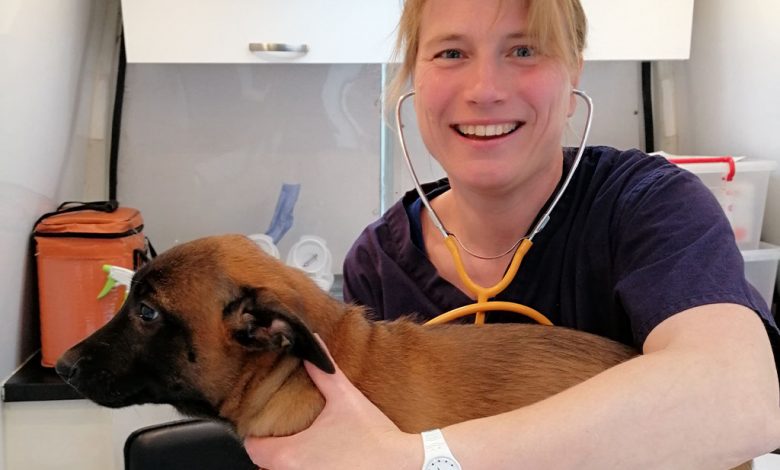Titre Testing: Make An Informed Decision on Vaccinating your Westie
Unsure whether to give your Westie a booster? Read on to find out more…
Westies, Poppy, Lillie, and Danny are off to the vets, but this is no ordinary trip to the practice. Instead, the tail-wagging Westies will be meeting vet Iris Ege, at an agility club near Gloucester, for something called Titre Testing. All three Westies are due for a booster vaccination against Distemper, Hepatitis and Parvo (DHP) but their owner, Jackie, has taken a progressive step to explore whether they really need their boosters this year.
A titre test is a straightforward blood test that shows how much you can dilute the blood and still detect antibodies against a disease. A higher titre correlates with good protection, offering the owner the choice of avoiding the risks of over-vaccination if their dog already has immunity to the tested diseases.
Iris gets to see quite a few agility dogs. Some have retired from sport like Poppy who is 15 years old and Lillie who is 12 years old. Age or sport injuries can cause aches and pains that can be treated. Younger ones commonly attend fitness workshops or have treatments that optimise their performance. Iris uses acupuncture and laser therapy. She also uses herbs for all sorts of problems from travel sickness to skin problems. Poppy and Lillie actually enjoy massage and have a referral for that, seeing Amy at the Edge Canine Club near Gloucester. The three Westies are in good health and love the car, so there is no need for any of that today. Iris simply examines them as she would when vaccinating to make sure no problems are missed. Poppy has been slowing down a bit recently and Iris gave some exercise advice to make sure she can stay active. Lillie has been really well since she had her painful eye removed. Danny is always nervous at the vets but calm and experienced Cecilia, Iris’s Assistant, gives him the reassurance he needs.
When to Titre Test and Why
Titre testing, instead of routinely giving out boosters, is recommended by the World Small Animal Veterinary Association (WSAVA) as gold standard after a Parvo vaccination at 16 weeks. Mostly, dogs are given their primary DHP vaccine earlier at between 8 and 12 weeks of age. The 1st year booster is just to cover the very few dogs that are not protected after the primary vaccination.
If testing shows a positive titre at 20 weeks of age, then there is no need to test or vaccinate DHP for three years. Contrary to popular belief, it is more important to test elderly dogs like Poppy and Lillie because immunity can be affected by age. At that stage, yearly testing can be more appropriate. Most importantly, most dogs we see have lasting protection from vaccines previously given so do not require their boosters.
Repeated antigenic challenges may cause hypersensitivity reactions which could harm your pet. The effect is described as “over immunisation”. The importance of vaccines is stressed in professional articles but “Unnecessary vaccination must be discouraged. Hypersensitivity reactions to vaccine components are real and must be guarded against.” Tizard IR, Adverse consequences of vaccination. Vaccines for Veterinarians, 2021; 115-130.
Weight seems to play a role in determining which dogs are worst affected by vaccination side effects. The average vaccine-associated adverse event rates occurring within three days of vaccination in dogs are 44 in 10,000 for dogs weighing 7.5 – 12.5 kg while only 12 in 10,000 for dogs over 45 kg. Moore, G.E., Guptil, L.F., Ward, M.P., et al. Adverse events diagnosed within three days of vaccine administration in dogs. JAVMA, 227, (2005): 1102–1108.
Late reactions are less likely to be reported and it is hard to establish causal relationships. In many cases the problem is an immune system that is already in overdrive. That is why we recommend a holistic approach to optimise health including a healthy diet, appropriate exercise and looking into imbalances before they manifest in serious health problems. For us, reoccurring otitis (ear infections) for example are a clear warning that the immune system is not right and using systemic immunosuppressive drugs should not be the first line approach.
In the face of a massive raise in allergies and autoimmune disease, we feel that the titre testing approach recommended by the WSAVA combines the protection vaccinations offer while minimising the risk of side effects.
While working in veterinary practices Iris has hospitalised two Parvo cases that seemed unusual: they were both just under one year old and vaccinated. In her training for titre testing Iris learned that high maternal antibodies in puppies can lead to puppy vaccines not being protective. This can happen if the mother is vaccinated while pregnant or has had Parvo. If a litter has that background, it can be tested for maternal antibodies to detect the optimum time that enables the primary vaccination to be effective.

Irrespective of age, you can get “non responders” to vaccinations that show up in the titre test, but mainly that seems to be a problem in the USA.
There are a few things you need to be aware of before deciding on titre testing. Leptospirosis is considered a core vaccine by the British Veterinary Association (BVA) and it can’t be tested for. Core vaccines according to the WSAVA are those which protect animals from severe, life-threatening diseases that have global distribution and which all dogs, regardless of circumstances or geographical location, should receive. Kennel Cough is not a core vaccine and can’t be tested for either.
Why titre test if you need to vaccinate against Leptospirosis and maybe even Kennel Cough anyway? Moore (2005) quantifies the difference that using multiple vaccinations makes. In dogs under 10 kg receiving a vaccine against one single disease, 30 adverse reactions per 10,000 dogs are reported within days. For multiple vaccines covering three diseases, 50 reactions per 10,000 are reported. A typical vaccination of that type would be Kennel Cough consisting of Parainfluenza and Bordetella combined with Leptospirosis.
We often have our dogs vaccinated against six diseases at the same time. A typical example would be DHP, Leptospirosis and Kennel Cough. The risk increases to 79 reactions per 10,000. We suspect that the late effects on the immune system, which are harder to quantify, increase in a similar way when more components are used in one jab.
Titre testing is thankfully becoming more popular giving many owners peace of mind rather than taking a risk and hoping that their dog has “natural immunity” without vaccination. As Iris points out, you won’t miss it if your puppy picks up parvo: it’s very infectious causing serious illness. You may be lucky and get away with an expensive hospitalization bill at the vets but, even with treatments, some puppies and even adult dogs die.
Due to vaccination programmes, Distemper and Hepatitis have fortunately become rare in the UK. There is an oft-quoted blog written by an American vet who lives in India; Iris has done charity work in Bihar and witnessed many puppies die of Parvo and has seen many dogs crippled by Distemper. Yes, if dogs in high infection areas survive the first year, they will be immune, but many will die or retain lasting damage.
A tiny amount of blood is taken from either the leg or the neck. Tests are usually run “in house” with a special test kit where 12 samples are tested at the same time. The test is a semiquantitative ELISA. The readout shows a number but that depends on how the test is calibrated; the final result is either “protected” or “not protected”. Though more expensive, you can also ask your vet to post samples direct to the lab.
Poppy and Lillie were relaxed about the blood testing, volunteering a leg which was thoroughly disinfected with spirit, the vein was then raised, and a small amount of blood taken. If dogs don’t like their leg being touched, the sample can be taken at the neck instead, which just requires clipping where the vein is hidden. Sensitive Danny was grateful for Cecilia’s calm presence and, a few treats later, happily trots back to his mum Jackie. We have learned from the Covid situation that many nervous dogs are calmer without their loving but obviously concerned humans.
A faecal sample kit can make sure that your pet doesn’t have worms either. Again, this should really be gold standard in veterinary practice instead of routine worming of animals. Did you know that worming tablets only treat active worm infections rather than preventing worms?
Although Iris loves using herbs for lots of conditions, they are unsuitable for worm infestations. While most of our titre tests have a “positive” result, meaning dogs are protected, most faecal egg counts and lungworm tests come back “negative”, meaning the dogs don’t need worming at that time.
At the agility club the next dog has arrived for titre testing. All the samples are going to be run after the clinic and an email will report the result, to be followed by a written certificate. The blood samples are applied to the vaccicheck plate, processed with the immuno comb and read after calibrating the test. With all three Westies having positive results, Iris is getting their certificates ready: these are needed for agility shows or boarding kennels.
Iris’s holistic referral service, A.P.Vet ltd., is based south of Hereford but she visits neighbouring Gloucestershire on a regular basis. If you are looking for titre testing and are from further afield the vaccicheck map will help you to find veterinary practices who offer the service. vaccicheckuk
There are also other laboratories that offer the test so, it is worth asking your vet, even if they are not on the list.






